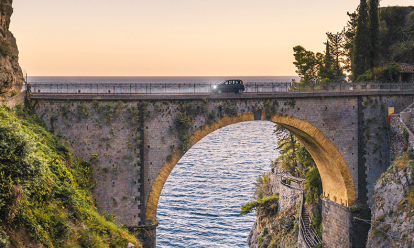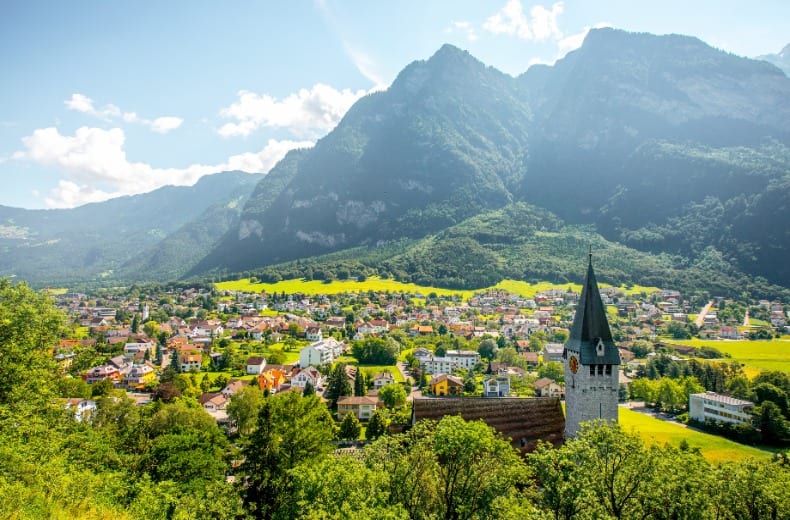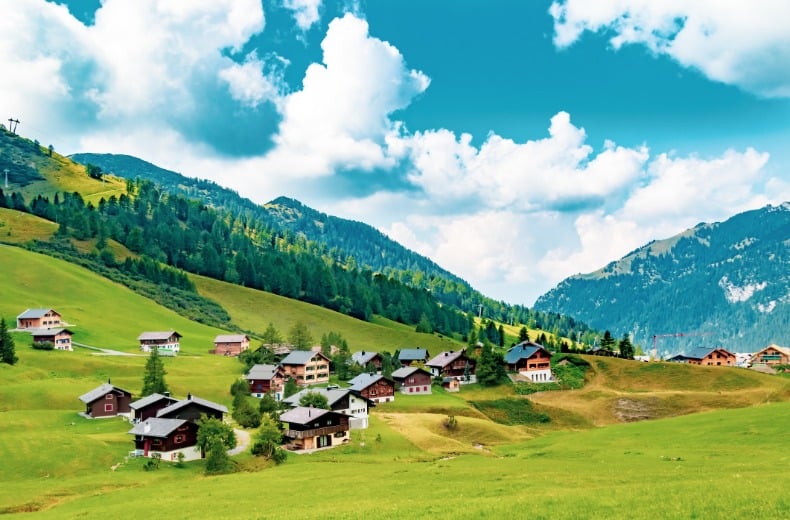Driving advice for every country in Europe
From required documents to European breakdown cover and vehicle accessories, find all the up-to-date driving laws and advice for every country in Europe in our travel guides.
Driving in Liechtenstein

But if you’re planning a road trip to Liechtenstein, it’s essential you’re fully prepared ahead of time as driving there has many differences to the UK.
To make your trip to the Continent as safe and effortless as possible, we’ve put together a guide to everything you need to know before you go, from required documents to rules of the road.
Driving a rented vehicle? Jump to the advice for driving a hire car in Liechtenstein section.
RAC European Breakdown Cover (Basic, Comprehensive and Single Trip) provides a wide range of benefits should you breakdown in Liechtenstein to ensure you stay safe.
To supplement this, RAC also offers travel insurance. Cover will include medical expenses, baggage, personal money and belongings, among many other benefits.
Need short-term car insurance for your vehicle? Our temporary car cover is perfect if you're looking for flexible insurance for between 1 hour and 30 days.

European Breakdown Cover
Get covered when driving in Europe for just £4.17 a day*.
*Price is based on European comprehensive breakdown cover for a 14 day trip, in a vehicle up to 1 year old, travelling in zone 1.

Things to take when driving in Liechtenstein

Documents for driving in Liechtenstein
- A valid, full UK driving licence (you must also be 18 or over)
- Your motor insurance certificate
- The V5 registration document for your own car or the hire car paperwork for a rental
Do I need a GB or UK sticker for driving in Liechtenstein?
From 28th September 2021, the distinguishing mark (or national identifier) displayed on vehicles registered in the United Kingdom that are driven abroad will change from GB to UK.
This means that vehicles registered in the UK must display the letters “UK” when driven in Liechtenstein.
The identifier can be incorporated in vehicle number plates (along with the Union Flag) or as a separate sticker. Note that vehicles featuring the letters GB together with the Council of Europe golden stars are no longer valid for driving abroad.
If your vehicle does not have the UK identifier within the number plate, you will require a UK sticker when driving in Italy. GB stickers will no longer be valid from the end of September.
Do I need an insurance green card?
From 2nd August 2021, drivers will no longer require an insurance green card for taking their vehicles to Liechtenstein.
ETIAS – 2025
ETIAS stands for the European Travel Information and Authorisation System. It is a visa program for visitors who don’t need a Schengen visa, who want to travel to the European Union and a few other European countries.
Visitors who purchase an ETIAS will be able to enter the 26 member states of the Schengen Zone as well as Bulgaria, Croatia, Cyprus, and Romania.
This will be launching in 2025. Learn more about ETIAS here.
Driving in Liechtenstein packing checklist
Aside from the documents above, there are some legally-required items you must bring with you to drive in Liechtenstein.
Unless your headlights can be adjusted, it's a legal requirement to carry headlamp converters (stickers for your headlights when driving on the right, so your lights don't dazzle motorists coming the other way).
A warning triangle is also compulsory to carry in vehicles in case of a breakdown.
You must also:
Be 18 or over
- Make sure everyone in the car wears a seat belt at all times
- Wear a crash helmet if you're riding a motorcycle
- Use dipped headlights when driving through tunnels - and it's recommended you use them the rest of the time too
- Ensure your car is covered by third-party insurance recognised in Liechtenstein. This is the legal minimum cover for residents and visitors, so check with your provider before you travel
It's also recommended to have:
- Spare bulbs for your car's external lights
- A fire extinguisher
- A first-aid kit
- A reflective jacket
- A Green Card (this is no longer a requirement, but it could be useful to back-up your insurance documents and show you've got the minimum legal level of cover. To find out more, contact your insurance company)
- A Camping Card International to give you additional proof of identity, third-party liability insurance, plus discounts at a wide range of campsites and tourist attractions
You can pick up all the car kit you need from RAC Shop.
Is there anything that I shouldn’t take with me?
Be aware that you cannot take the following with you into Liechtenstein:
- meat or products containing meat
- milk or dairy products
You cannot take the following unless you pay to have them inspected before you leave and get a ‘phytosanitary certificate’:
- fresh fruit (apart from bananas, coconuts, dates, pineapples and durians)
- vegetables
- plants
- plant products
Rules of the road in Liechtenstein
- If you’re taking your own vehicle to Liechtenstein, you should apply for an International Certificate for Motor Vehicles (ICMV) which you will need to carry as well as the original vehicle registration document
- In Liechtenstein, you drive on the right and overtake on the left. Pedestrians generally have right of way
- When overtaking, you must indicate before moving back into the right-hand lane
- During the day, you must sound your horn before going round a sharp bend with limited visibility. At night, flash your headlights instead
- You won't have to pay motorway tolls in Liechtenstein, but if you venture further afield you might have to pay them in the neighbouring countries, Austria and Switzerland
- Petrol and diesel are readily available, along with a lead-replacement additive. If you need LPG, it's sold in Switzerland
- If you're caught committing a motoring offence while driving through Liechtenstein, you’ll be given an on-the-spot fine
- Seat belts should be worn in all seats where a belt is available
- Children under the age of 12 and measuring less than 150cm in height must be placed in a child restraint conforming with European safety standards
- The drink-drive limit is 0.08%. The police can ask any driver to undergo a breath test
- If you have a GPS navigation system that shows you where any fixed speed cameras are, you must deactivate this function. It's illegal to use any radar detection equipment
Speed limits in Liechtenstein
The speed limit is 50km/h in built-up areas, 80km/h on open roads and 120km/h on motorways
Other things you should know when driving in Liechtenstein

- Parking is generally not a problem in Liechtenstein as the roads are quiet. Wheel clamps aren’t used, but if you park illegally or cause an obstruction your vehicle can be towed away
- Hitch-hiking isn't allowed on motorways and other major roads
- Harsh alpine winters often make driving conditions more challenging. You should equip your car with winter tyres or snow chains and check road conditions before you set off
In an emergency
112 - Here's a really important bit of knowledge; you can dial 112 from anywhere in Europe and an operator will connect you to an emergency service in the country you're visiting.
Operators can answer your call in their native language, English or French.
Breaking down in Liechtenstein
RAC offers great-value, flexible RAC European breakdown cover tailored to meet your needs. We also offer comprehensive travel insurance, including cover for medical expenses, baggage, personal money and belongings.
Driving a hire car in Liechtenstein
Not all of the information in the guide above will be relevant to those looking to rent a hire car in Liechtenstein.
Though it might be a good idea to read through everything anyway, here are the most important things to know for drivers of rental vehicles:
Rental information
- The minimum age to hire a car can vary by company, it's best to check beforehand with your provider
- You need a full, valid UK driving licence and usually a second proof of ID (passport)
- Some car rental companies ask that you have held your licence for a minimum term - check with your hire company first
- Most companies require you to use a credit card for deposit
- You may not be able to drive outside of Liechtenstein unless planned in advance - check with your hire company first
- Make sure you get car hire excess insurance before your trip to protect yourself from unexpected costs. It's almost always cheaper to do this with a separate insurer and in advance
Hire car driving tips
- Liechtensteiners drive on the right and overtake on the left - the opposite to the UK
- The national speed limit on Liechtensteinian motorways is 120km/h (74mph) . On a main road outside a built-up area it's 80 km/h. For built-up areas it’s 50km/h
- Dial 112 in an emergency
- It’s compulsory to wear seat belts in the front and rear seats
- The blood alcohol content limit for drivers of private vehicles is 0.08%. That's the same as the 0.08% in England Wales and Northern Ireland, but the higher than the 0.05% of Scotland.


UK Government travel advice
There is no British Embassy in Liechtenstein. The British Embassy in Berne is responsible for developing and maintaining relations between the United Kingdom and Liechtenstein.
British Embassy
Thunstrasse 50
3005 Berne
Switzerland
Email: [email protected]
Telephone+41 (0)31 359 7700
Fax (general)+41 (0)31 359 7701
Fax (consular)+41 (0)31 359 7765
Out of hours emergencies+41 (0)31 359 77 00
